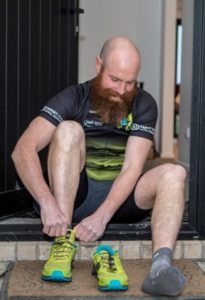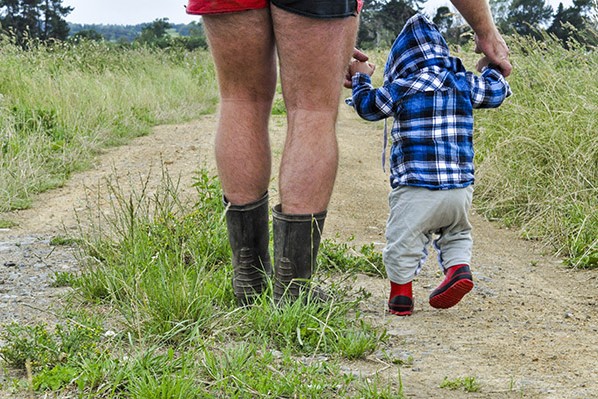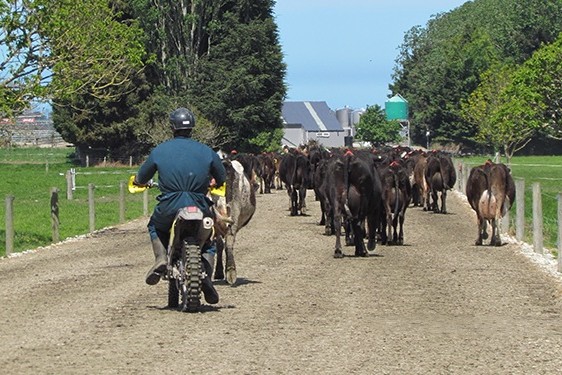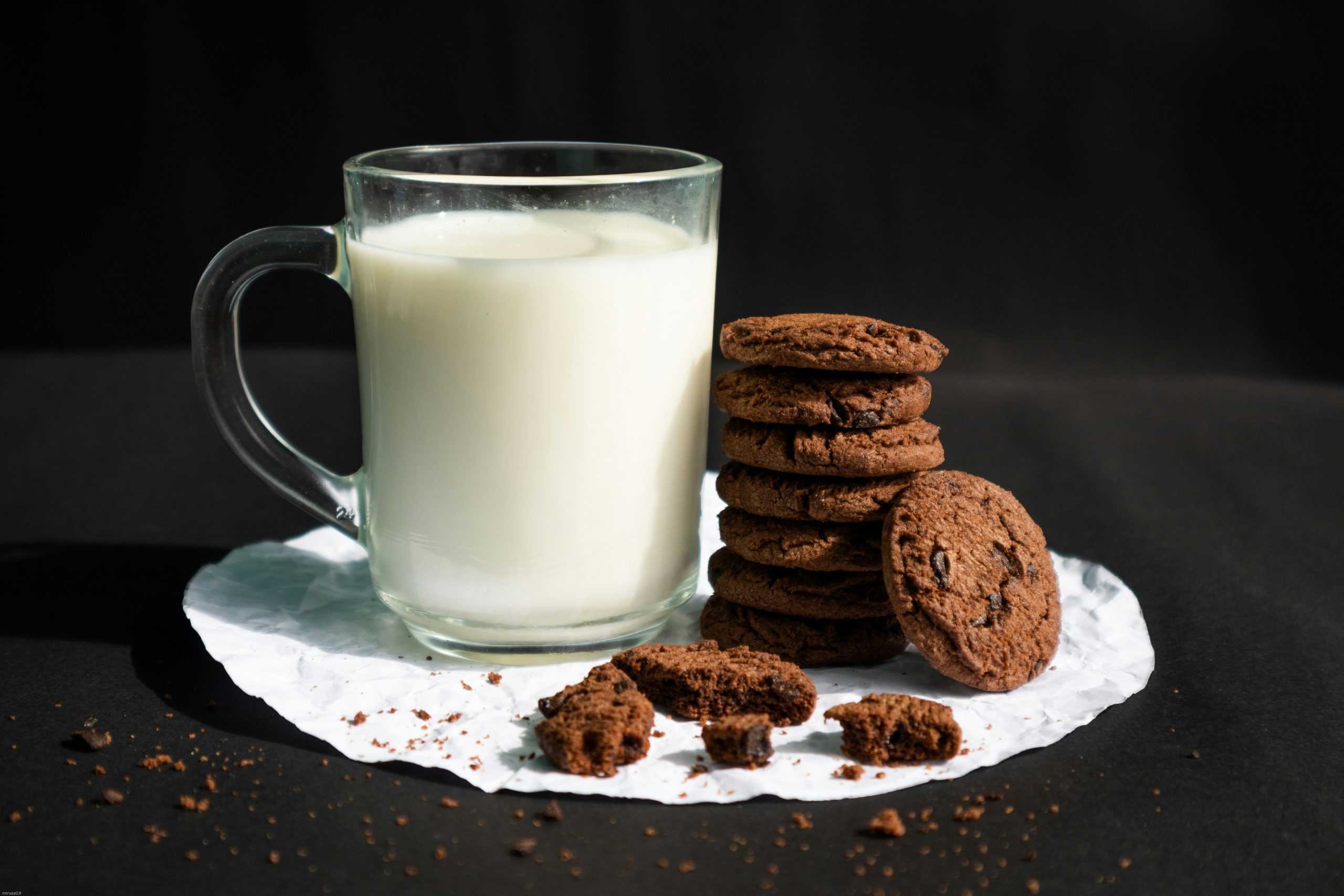Southland sharemilker Michael Prankerd had days when he was paralysed by fear and found himself suffering from burnout. He shared his story at SIDE and Anne Lee talked to him about how endurance running and widening the number of metrics he measures success by has helped turn that around. Photos: Megan Graham
On the outside sharemilker Michael Prankerd has always been a high achieving gogetter, ticking off progression milestones in a successful business.
But on the inside it was a different story – three years ago there was a whole different monologue going on in his head. Michael was slowly sliding into a state where he couldn’t see joy in life and was becoming paralysed by fear and anxiety.
He was burning out.
Today he and his wife Ruth are still gogetter sharemilkers, 50/50 sharemilking 860 cows at Otipiri near Winton in Southland and sharemilking another 700 cows at Mabel Bush with a manager.
They’re also still ticking off progression milestones but the way they measure success has changed and Michael is no longer wracked with panic.
Michael shared his story of the slow slide down and gradual climb back up to wellbeing at SIDE in a workshop with Ian Handcock from Fit4Farming and Target Focus.
‘Most of the things I have worried about in my life have never happened.’
Prior to coming to Southland in 2015 Michael and Ruth had been sharemilking in Taranaki.
They were sharemilking 500 cows through a 28-bail rotary – milking 10 hours a day.
“We were working really hard and our goals were mainly financial. We were striving to be the absolute best all the time, no matter what the season, no matter what the circumstances – it was all we were focused on.”
While he didn’t recognise the signs of burnout, Ruth knew things weren’t good and urged him to get some help with techniques to manage his mental wellbeing.
He admits his self-talk wasn’t great.

“I always felt like nothing was good enough, nothing was going right. I was physically exhausted all the time and had no time for just living life.
“We’d just had our first child and I was struggling to see the joy and feel joy in what we were doing.”
While he can laugh about it now, Michael recounts how a mis-dialled phone call to try and get some help set him back even further. He’d thought he had called the Rural Support Trust.
“I was in a state and blurted out all my problems and when the woman who answered the phone finally got to speak, she said she was really sorry to hear that but she was the Wellington Taxi Service.
“I hung up and couldn’t face it again for quite some time. It really set me back quite badly.”
Just after that though Michael, still holding it together on the outside and ever driven, made the decision along with Ruth to take the bold step and move south.
“We’d travelled around the country looking for the next step because we were wanting to grow, grow, grow. We saw where the large herds were and we saw that Southland was where we fitted in the world.”
But as it turned out, it wasn’t just them heading south.
In that first season after their move the payout took a big nose-dive, sinking to $3.80/kg milksolids (MS).
Initially he was buoyed by adrenalin and the excitement of the move but it wore off fast when he could see they weren’t going to get anywhere near the returns they’d expected, Michael says.
“There was no way we were going to hit our financial objectives which were all right up there and demanding. They were geared towards us getting ahead so that made me feel like I was letting everyone down.
“I had no escape from it. We were pinching pennies everywhere and that’s really where I went from not feeling good enough to anxiety attacks that paralysed me and took over my life.”
He saw the worst-case scenarios in everything.
“I’d be running though scenarios like what would happen if mating results were bad and I’d get shaky, dizzy, nauseous – all those feelings of a panic attack.”
They’d been planning to do all AI that year but half-way through Ruth could see how bad Michael was feeling and strongly pushed him to reach out for help.
“I took the coward’s way a little and went to the doctor complaining about nausea and dizziness but doctors are smart and saw through that and quickly worked out what it actually was.”
He was prescribed anti-depressant and anti-anxiety medication and connected with a rural support network nurse. She helped immensely but Michael suffered from side effects from the drugs and focused more on cognitive therapy techniques.
He used and still uses mindfulness and meditation and learnt more about anxiety and how to manage it.
“When I was having the panic attacks I was focusing on the worst possible scenario and spiralling into despair that those scenarios were really going to happen.
“It was a matter of lifting my head and saying okay what does that worst-case scenario really look like, how bad would that actually be, what would I do about it.”
That process brought him back to rational thought and by giving himself the space to see the problem more realistically he could also see the path forward wasn’t actually that bad and the likelihood of that absolute worst-case scenario happening was very low.
“Most of the things I’ve worried about in my life have never happened.
“That was the mind change that needed to take place. It didn’t happen straight away – just like the slow move to burnout wasn’t obvious or immediate.”
He put other tactics into play too. He joined Toastmasters for a year to give his mind something else to think about.
He also rediscovered the joy and benefits of running as well as taking up mountain biking for the first time.
Running has become his “go-to place”. “Especially endurance running – it really helps me get into my place, makes me feel alive.”
As well as the mental benefits of physical exercise, boosting the feel-good hormones in the body and rapidly dissipating the panic-inducing fight or flight hormones, Michael gets a buzz out of the sense of adventure that comes with being out on the trail in nature.
In true Michael fashion he pushes himself and has completed three 45-55km off-road events as well as multiple other races. But he says it doesn’t have to be all or nothing and he gets huge benefits from getting off farm and into nature. If you’ve got a hilltop, a river or a track there’s always an adventure to be had, he says.
“As dairy farmers we often do the same things day after day and it’s really hard to differentiate a successful day from any other day.
“There are so many things in your own neighbourhood that you probably haven’t ever seen or checked out but if you give yourself time and permission to go do that, set it as a priority and do it – well to me that’s a successful day.”
Broadening how they measure success has meant a significant shift in their overall sense of wellbeing. It’s also given Michael a sense of perspective in what is still a goal-focused, high-achieving lifestyle that continues to grow.
Two years ago they completed the Farming to Freedom programme with Dylan and Sheree Ditchfield and were challenged over the narrow nature of the metrics they used to determine how well they were doing.
“We were really focused on just a few numbers – profit and business growth were the main ones.”
Through the course though they came to realise that in some years hitting those targets might not happen due to circumstances outside of their control. If payout fell out of bed or they were hit by a dry autumn or wet spring, for instance.
“In some years, no matter how tight your cost control is or how well you manage your feed you’re not going to hit your targets.
“If that’s the only way you measure success and you don’t succeed then what do you feel like? You feel like you’re failing.
“But if you have a balanced score card that includes things like people, community, wellbeing, and environment and you write down what you’ve achieved in those areas there wouldn’t be a person in the industry who couldn’t feel like they’ve achieved something.”
Michael says they’ve also lengthened the horizon when it comes to setting budgets and measuring progress after heeding some advice through a business mentoring programme offered by Venture Southland. Michael and Ruth made use of the scheme during the low-payout year and were put in touch with 2003 Southland Sharemilker of the Year Matt Richards, now the chief executive of Fortuna Group.
“I’ll be grateful to him for a long time because – while it hasn’t changed anything we do onfarm, it has changed how we look at things.
“When you go looking for solutions and recognise the problems rather than just focusing on the hardship you find there are a lot of people out there who can help and there are solutions.”
Michael says they now build budgets and targets with five-year horizons.
“When we were so focused on just one year’s results we were really just looking at one tiny moment in time.
“I’d get stuck there. Even before we knew final results I’d start imagining the worst.”
Now he looks at the trend and can see through the ups and downs. Fear no longer drives his decisions and while he says there can still be tough days the journey is a whole lot more fun.





